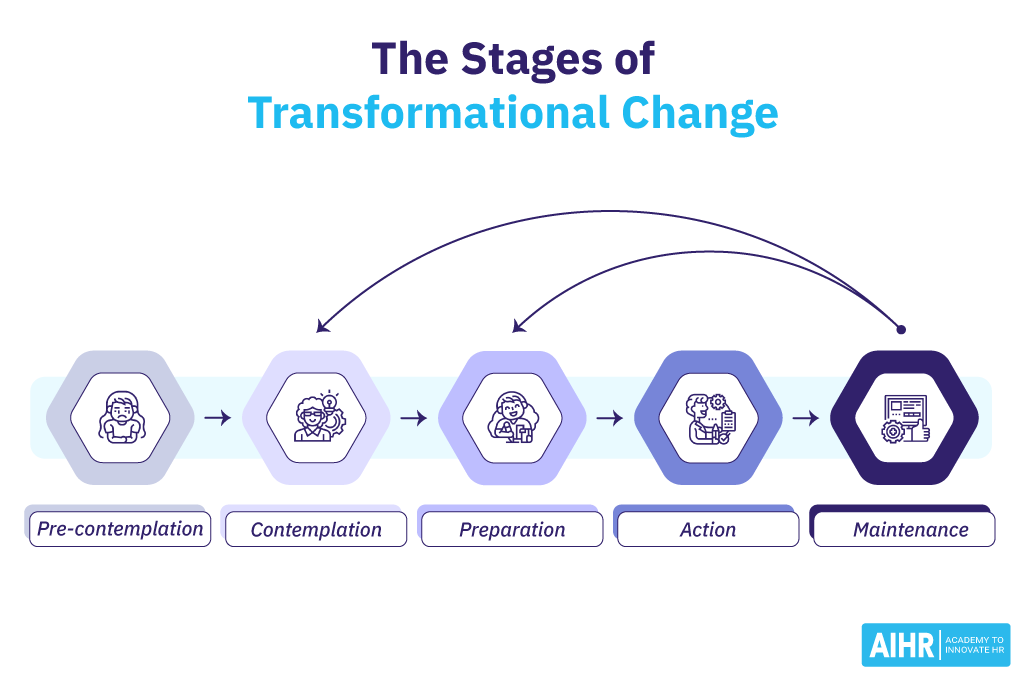Transformational Change
What is transformational change?
Transformational change is a type of change that occurs when an organization makes a fundamental change in how they operate. It’s often triggered by changes in an organization’s environment.
This type of change can be challenging, but it can also lead to significant improvements in performance. Transformational change typically requires a new vision, new goals, culture change, and new ways of doing things. It can be difficult to implement, but the rewards can be significant.
The key benefits of transformational change include increased employee engagement, improved performance, and higher levels of creativity and innovation.
The role of HR in transformational change is crucial. HR professionals need to identify when a change is needed and help create a vision for the future that inspires employees and managers alike. They also need to be able to manage the transition process, ensuring that everyone is on board and that the change is executed successfully.
How to manage transformational change
When it comes to change, there are two types: transformational and transactional.
Transformational change is about evolving the organization as a whole and developing new processes and ways of working that make the company more successful. It’s about creating a new future for the company, which can be difficult to achieve.
Transactional change, on the other hand, is about fixing specific problems. It’s easier to achieve and often less risky, but it doesn’t have the same long-term impact as transformational change.
So how do you manage transformational change? Here are 4 steps to help you get started:
- Establish a clear goal for the change initiative.
- Get everyone on board with the vision for the future.
- Create a roadmap for how to get there.
- Put in place mechanisms to track progress and ensure success.
What are the characteristics of transformational change?
There are four key characteristics of transformational change:
- It is a change in mindset, not just a change in procedure or policy.
- It leads to radical improvements in performance.
- It is based on a deep understanding of the business and its customers.
- It requires buy-in from everyone in the organization.
Examples of transformational change
Transformational change examples include:
- Putting in place significant strategic and cultural reforms.
- Embracing technology that is very different.
- Making substantial operational adjustments to accommodate increased supply and demand.
- Modifying product and service offerings in response to unanticipated competition and sharp revenue declines.
While implementing transformative changes, it’s essential that you create and share a clear plan that details the ways you are using to make changes and the objectives you have established.
To achieve the desired outcome, you need to:
- Reiterate your justification for the adjustments often.
- Systematically create and execute new organizational structures and procedures.
- Include your team in all planning and discussion stages of change, and stay in constant contact with them.
What are the stages of transformational change?

There are 5 stages of transformational change:
- Pre-contemplation: At this stage, you are not even aware that there’s a problem. They may be content with the status quo and not interested in changing anything.
- Contemplation: In this stage, you become more aware of the problem and may start to consider possible solutions.
- Preparation: At this stage, you may start to take action to address the problem, such as doing research or seeking out guidance from others.
- Action: This is when you actually start making changes in their lives, such as adopting new behaviors or quitting smoking cold turkey.
- Maintenance: At this stage, you have hopefully integrated the changes made and are working to maintain the progress.
Key takeaway for HR
At its heart, transformational change is about creating your organization’s new and better future. It’s a process that can be broken down into 4 distinct stages, and it requires careful planning and execution if you want to achieve lasting results.







